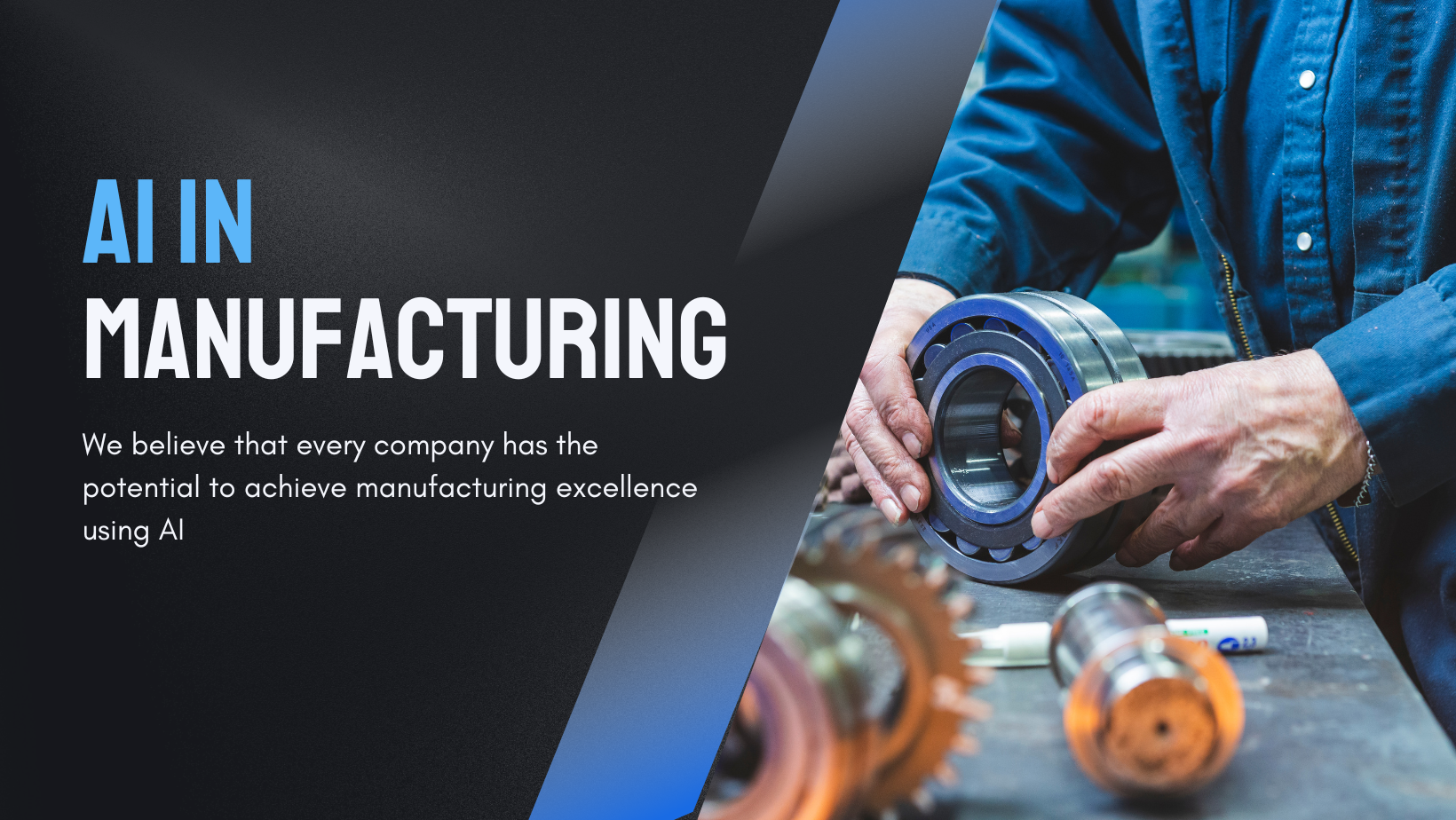
Artificial Intelligence is a trending topic across numerous industries. However, an important question stands out: is AI actually delivering real benefits to manufacturers?
What is AI in manufacturing
AI in manufacturing involves leveraging Machine Learning (ML) and Deep Learning (DL) technologies to automate complex tasks and uncover hidden patterns, thereby enhancing manufacturing processes through improved data analysis and decision-making.
As companies increasingly engage in data-driven activities, they are evolving into data-centric organizations. With the massive amounts of data generated by industrial IoT devices, smart sensors, and human inputs, AI applications in manufacturing are driving unprecedented levels of efficiency, customization, and productivity. Integrating AI into manufacturing falls under the Fourth Industrial Revolution (Industry 4.0).
The role of AI in manufacturing
Generative AI can enhance production processes by developing new solutions and designs based on existing frameworks. These systems are proficient in analyzing large volumes of accumulated data, identifying patterns, and using user feedback to significantly boost performance. Unlike traditional methods that rely on manual updates, generative AI benefits from an iterative feedback loop that drives continuous improvement. This makes it a powerful tool for interpreting complex inputs and refining processes. Generally, the effectiveness of generative AI outputs depends on the quality and extent of the data and feedback it receives from users.
How is AI Used in the Manufacturing Industry?
AI is transforming manufacturing through various applications that enhance efficiency, productivity, and decision-making. Here is some key ways AI is used in manufacturing:
Predictive Maintenance:
AI algorithms analyze data from sensors and equipment to predict when a machine is likely to fail or require maintenance. This helps prevent unexpected breakdowns and reduce downtime.
Quality Control:
AI-powered vision systems inspect products in real time, identifying defects or deviations from quality standards with high accuracy. This reduces the need for manual inspection and ensures consistent product quality.
Process Optimization:
AI optimizes manufacturing processes by analyzing data to find inefficiencies or bottlenecks. It can suggest adjustments to improve production rates, reduce waste, and enhance overall efficiency.
Supply Chain Management:
AI improves supply chain operations by predicting demand, optimizing inventory levels, and managing logistics. This leads to better resource allocation and reduces costs associated with overstocking or stockouts.
Predictive Analytics:
By analyzing historical data and current trends, AI provides forecasts and insights that help in planning and decision-making. This includes predicting market demands, managing production schedules, and optimizing resource usage.
Robotics and Automation:
AI-driven robots and automated systems perform repetitive and complex tasks with high precision. These systems can adapt to changes in production needs and work alongside human operators.
Energy Management:
AI monitors and controls energy consumption in manufacturing facilities. It identifies patterns and anomalies to optimize energy use, reduce costs, and minimize environmental impact.
Product Design and Development:
AI assists in designing products by analyzing data on customer preferences, market trends, and material performance. It can accelerate the design process and lead to more innovative and competitive products.
Worker Assistance:
AI provides real-time support to workers through augmented reality (AR) and virtual reality (VR) applications. These technologies offer guidance, training, and support for complex tasks.
Customization and Personalization:
AI enables the production of customized products at scale by analyzing customer data and preferences. This leads to more personalized products and improved customer satisfaction.
Overall, AI integrates with existing manufacturing systems to enhance capabilities, streamline operations, and drive innovation in the industry.
Examples of AI in Manufacturing
· Supply Chain Optimization: AI enhances inventory management, supplier selection, and logistics efficiency, fostering cost-effectiveness and responsiveness throughout the supply chain.
· Predictive Maintenance: AI predicts equipment failures in advance, allowing for proactive maintenance scheduling and optimal equipment performance.
· New Product Development: AI aligns new product design with market trends, customer preferences, and competitor analysis, paving the way for innovative products.
· Performance Optimization: AI streamlines manufacturing processes by identifying inefficiencies and improving productivity.
· Quality Assurance: AI-driven quality control ensures adherence to standards and minimizes defects.
Manufacturing Industry Data
In an intelligent factory, industrial data collected from various touchpoints functions like a nervous system. AI relies on this extensive data to analyze and convert it into actionable insights. Consequently, data is crucial for transforming traditional factories into AI-driven industries. Key data collection points include:
· Real-Time Monitoring Sensors: Industrial IoT sensors and advanced analytics enable manufacturers to monitor every aspect of production in real-time, allowing for immediate adjustments as needed.
· Supply Chain Data: Data from supplier performance, inventory levels, sales, and demand forecasts facilitate responsive and adaptable supply chain management.
· Environmental Data: Information on energy consumption, waste management, and greenhouse gas emissions helps manufacturers optimize their operations for greater sustainability and environmental responsibility.
How AI revolutionize manufacturing industry
AI is revolutionizing the manufacturing industry through various transformative changes that enhance efficiency, innovation, and sustainability. Here’s how:
1. Enhanced Predictive Maintenance:
AI models analyze data from machinery and equipment to predict potential failures before they occur. This allows for proactive maintenance, reducing unexpected downtime and extending equipment lifespan.
2. Advanced Quality Control:
AI-driven vision systems inspect products for defects with high precision. By analyzing images and data in real-time, these models ensure consistent product quality and reduce the need for manual inspections.
3. Optimized Production Processes:
AI models identify inefficiencies and bottlenecks in production lines by analyzing historical and real-time data. They suggest adjustments to improve workflow, increase efficiency, and reduce waste.
4. Intelligent Supply Chain Management:
AI models forecast demand, optimize inventory levels, and manage logistics more effectively. By analyzing data from various sources, these models enhance supply chain responsiveness and reduce costs associated with overstocking or stockouts.
5. Personalized Product Design:
AI models leverage customer data and market trends to assist in designing customized products. This capability allows manufacturers to cater to specific customer preferences and enhance product innovation.
6. Improved Energy Management:
AI models monitor and analyze energy usage across manufacturing facilities. They identify patterns and inefficiencies, helping to optimize energy consumption and reduce costs.
7. Enhanced Worker Assistance:
AI-driven tools provide real-time support and training through augmented reality (AR) and virtual reality (VR). These technologies help workers perform complex tasks more effectively and safely.
8. Adaptive Robotics:
AI models enable robots to learn and adapt to new tasks or changes in the production environment. This flexibility improves automation and allows robots to work alongside human operators more efficiently.
9. Real-Time Data Analytics:
AI models process vast amounts of data in real-time, providing actionable insights that help in decision-making. This capability enhances responsiveness and strategic planning within manufacturing operations.
10. Efficient Waste Management:
AI models track and analyze waste generation throughout the production process. By identifying patterns and sources of waste, these models help implement strategies to minimize waste and enhance sustainability.
In summary, AI models are driving innovation in manufacturing by improving maintenance practices, quality control, process optimization, supply chain management, product design, energy efficiency, worker assistance, and waste management, ultimately leading to more efficient, responsive, and sustainable manufacturing operations.
Conclusion
In conclusion, AI is indeed revolutionizing the manufacturing sector by driving significant advancements across various facets of the industry. From enhancing predictive maintenance and optimizing production processes to improving quality control and transforming supply chain management, AI is reshaping how manufacturing operates. These innovations lead to greater efficiency, reduced costs, and improved product quality, while also supporting sustainability and fostering new levels of customization. As AI continues to evolve, its impact on the manufacturing sector will likely deepen, further transforming traditional practices and setting new standards for the future of industrial operations.





